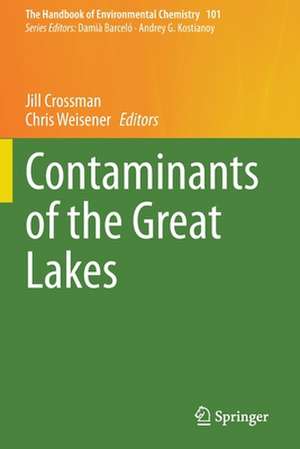Contaminants of the Great Lakes: The Handbook of Environmental Chemistry, cartea 101
Editat de Jill Crossman, Chris Weiseneren Limba Engleză Paperback – 19 sep 2021
| Toate formatele și edițiile | Preț | Express |
|---|---|---|
| Paperback (1) | 2468.50 lei 6-8 săpt. | |
| Springer International Publishing – 19 sep 2021 | 2468.50 lei 6-8 săpt. | |
| Hardback (1) | 2474.49 lei 6-8 săpt. | |
| Springer International Publishing – 18 sep 2020 | 2474.49 lei 6-8 săpt. |
Din seria The Handbook of Environmental Chemistry
- 18%
 Preț: 1819.46 lei
Preț: 1819.46 lei - 18%
 Preț: 1827.32 lei
Preț: 1827.32 lei - 18%
 Preț: 2102.76 lei
Preț: 2102.76 lei - 18%
 Preț: 2089.35 lei
Preț: 2089.35 lei - 18%
 Preț: 2481.57 lei
Preț: 2481.57 lei - 18%
 Preț: 1223.43 lei
Preț: 1223.43 lei - 5%
 Preț: 1419.56 lei
Preț: 1419.56 lei - 15%
 Preț: 639.41 lei
Preț: 639.41 lei -
 Preț: 392.97 lei
Preț: 392.97 lei - 5%
 Preț: 366.56 lei
Preț: 366.56 lei - 18%
 Preț: 1826.69 lei
Preț: 1826.69 lei - 15%
 Preț: 640.71 lei
Preț: 640.71 lei - 18%
 Preț: 728.91 lei
Preț: 728.91 lei - 5%
 Preț: 1424.89 lei
Preț: 1424.89 lei - 18%
 Preț: 1225.94 lei
Preț: 1225.94 lei -
 Preț: 386.00 lei
Preț: 386.00 lei - 18%
 Preț: 732.70 lei
Preț: 732.70 lei - 15%
 Preț: 641.53 lei
Preț: 641.53 lei - 5%
 Preț: 1416.81 lei
Preț: 1416.81 lei - 15%
 Preț: 644.82 lei
Preț: 644.82 lei - 5%
 Preț: 1421.76 lei
Preț: 1421.76 lei -
 Preț: 386.39 lei
Preț: 386.39 lei -
 Preț: 389.49 lei
Preț: 389.49 lei - 5%
 Preț: 719.02 lei
Preț: 719.02 lei - 5%
 Preț: 714.63 lei
Preț: 714.63 lei - 18%
 Preț: 1215.22 lei
Preț: 1215.22 lei -
 Preț: 392.97 lei
Preț: 392.97 lei - 18%
 Preț: 1832.08 lei
Preț: 1832.08 lei - 15%
 Preț: 639.73 lei
Preț: 639.73 lei - 5%
 Preț: 1925.56 lei
Preț: 1925.56 lei -
 Preț: 381.98 lei
Preț: 381.98 lei - 5%
 Preț: 363.97 lei
Preț: 363.97 lei -
 Preț: 386.00 lei
Preț: 386.00 lei - 5%
 Preț: 1423.39 lei
Preț: 1423.39 lei - 15%
 Preț: 643.16 lei
Preț: 643.16 lei -
 Preț: 383.12 lei
Preț: 383.12 lei - 15%
 Preț: 642.51 lei
Preț: 642.51 lei - 5%
 Preț: 716.09 lei
Preț: 716.09 lei - 5%
 Preț: 1407.87 lei
Preț: 1407.87 lei - 18%
 Preț: 1231.01 lei
Preț: 1231.01 lei
Preț: 2468.50 lei
Preț vechi: 3010.36 lei
-18% Nou
Puncte Express: 3703
Preț estimativ în valută:
472.46€ • 509.99$ • 396.16£
472.46€ • 509.99$ • 396.16£
Carte tipărită la comandă
Livrare economică 19 aprilie-03 mai
Preluare comenzi: 021 569.72.76
Specificații
ISBN-13: 9783030578763
ISBN-10: 3030578763
Ilustrații: XII, 265 p. 1 illus.
Dimensiuni: 155 x 235 mm
Greutate: 0.4 kg
Ediția:1st ed. 2020
Editura: Springer International Publishing
Colecția Springer
Seria The Handbook of Environmental Chemistry
Locul publicării:Cham, Switzerland
ISBN-10: 3030578763
Ilustrații: XII, 265 p. 1 illus.
Dimensiuni: 155 x 235 mm
Greutate: 0.4 kg
Ediția:1st ed. 2020
Editura: Springer International Publishing
Colecția Springer
Seria The Handbook of Environmental Chemistry
Locul publicării:Cham, Switzerland
Cuprins
Contaminants in the Great Lakes: An Introduction.- Occurrence, sources, transport and fate of microplastics in the Great Lakes – St. Lawrence River Basin.- Spatial and temporal trends of metals and organic contaminants in the Huron-Erie corridor : 1999-2014.- A review of heavy metals contamination within the Laurentian Great Lakes.- Binational efforts addressing cyanobacterial harmful algal blooms in the Great lakes.- Impacts of invasive species in the Laurentian Great Lakes.- Understanding the ecological consequences of ubiquitous contaminants of emerging concern in the Laurentian Great Lakes watershed: a continuum of evidence from the laboratory to the environment.- Geochemical approaches to improve nutrient source tracking in the Great Lakes.- Advances in remote sensing of Great Lakes algal blooms.- Land use, land cover, and climate change in southern Ontario: implications for nutrient delivery to the lower Great Lakes.- Enhanced transboundary governance capacity needed toachieve policy goals for harmful algal blooms.
Notă biografică
Jill Crossman is an Associate Professor at the University of Windsor, working in the field of hydrochemistry. Her research focuses on interactions between land management and aquatic ecosystems, on improving lake recovery rates with regard to harmful algal blooms and associated oxygen depletion, and on emerging contaminants, specifically microplastics.
Chris Weisener is a Professor of Geomicrobiology with a research focus on geochemical elemental cycling in sediment/aqueous compartments. His work aims to broaden our understanding of the mechanisms influencing the mobility, cycling and chemical form of metals and nutrients.
Chris Weisener is a Professor of Geomicrobiology with a research focus on geochemical elemental cycling in sediment/aqueous compartments. His work aims to broaden our understanding of the mechanisms influencing the mobility, cycling and chemical form of metals and nutrients.
Textul de pe ultima copertă
This book reviews the globally important freshwater resource of the Great Lakes, which is currently threatened by contaminants that compromise water quality and impact its ecological and economic health. Divided into four parts, this volume covers historic, current and emerging sources of contamination from heavy metals and persistent organic pollutants to microplastics; and identifies their ecological impacts. Due to factors ranging from rapidly changing land use practices, climate change and our emerging understanding of their impact on biological, chemical and physical interactions, the effectiveness of management strategies has proven highly variable. Continued enhancements in the rate of lake recovery are required to sustain the health of the Great Lakes. Accordingly, the book also explores recent advances in contaminant detection, along with future steps forwardin lake management approaches. Revealing our current knowledge gaps and providing a roadmap towards sustainable solutions, the book offers a valuable asset for scientists, managers and the public alike.
Caracteristici
Highlights technological advances in identifying, monitoring, and predicting contaminant source, transport and fate within the Great Lakes Characterizes interactions between existing and emerging contaminants (e.g. PCBs and microplastics) Includes contributions from US and Canadian scientists, and from federal and provincial departments, reflecting the topic’s transboundary nature
